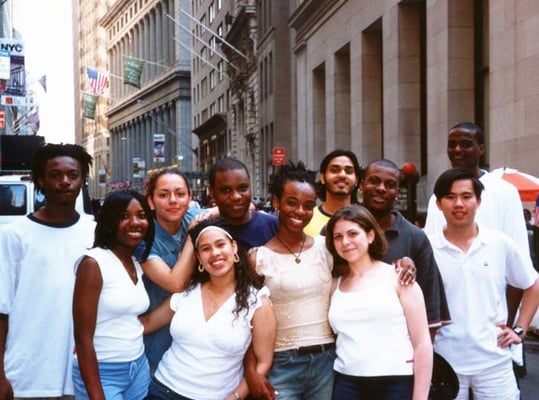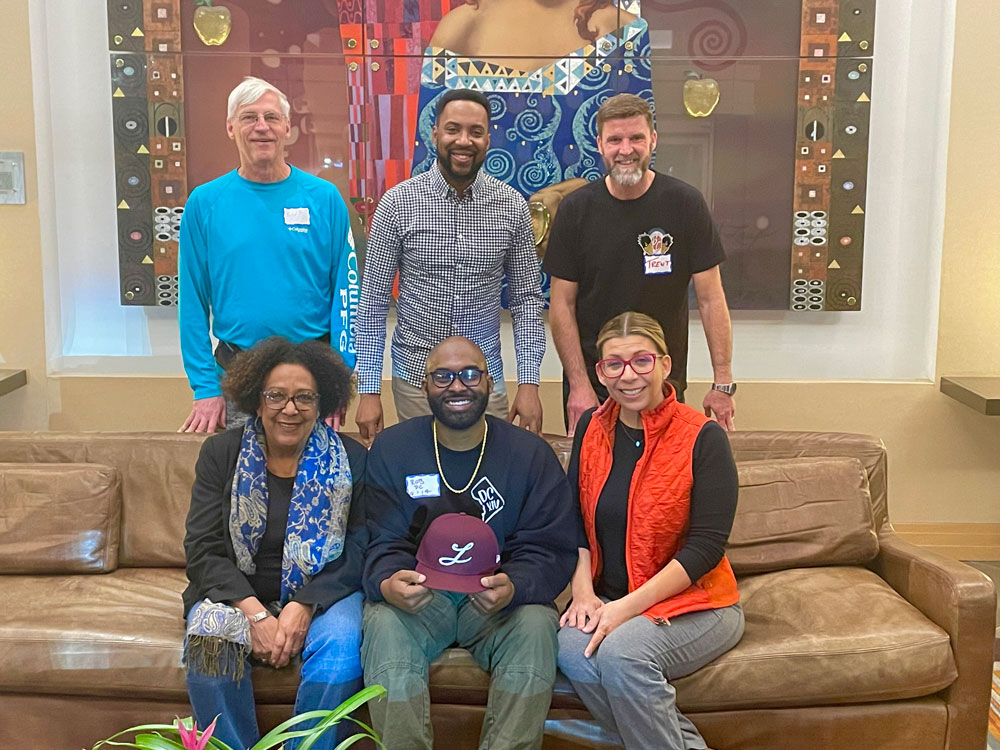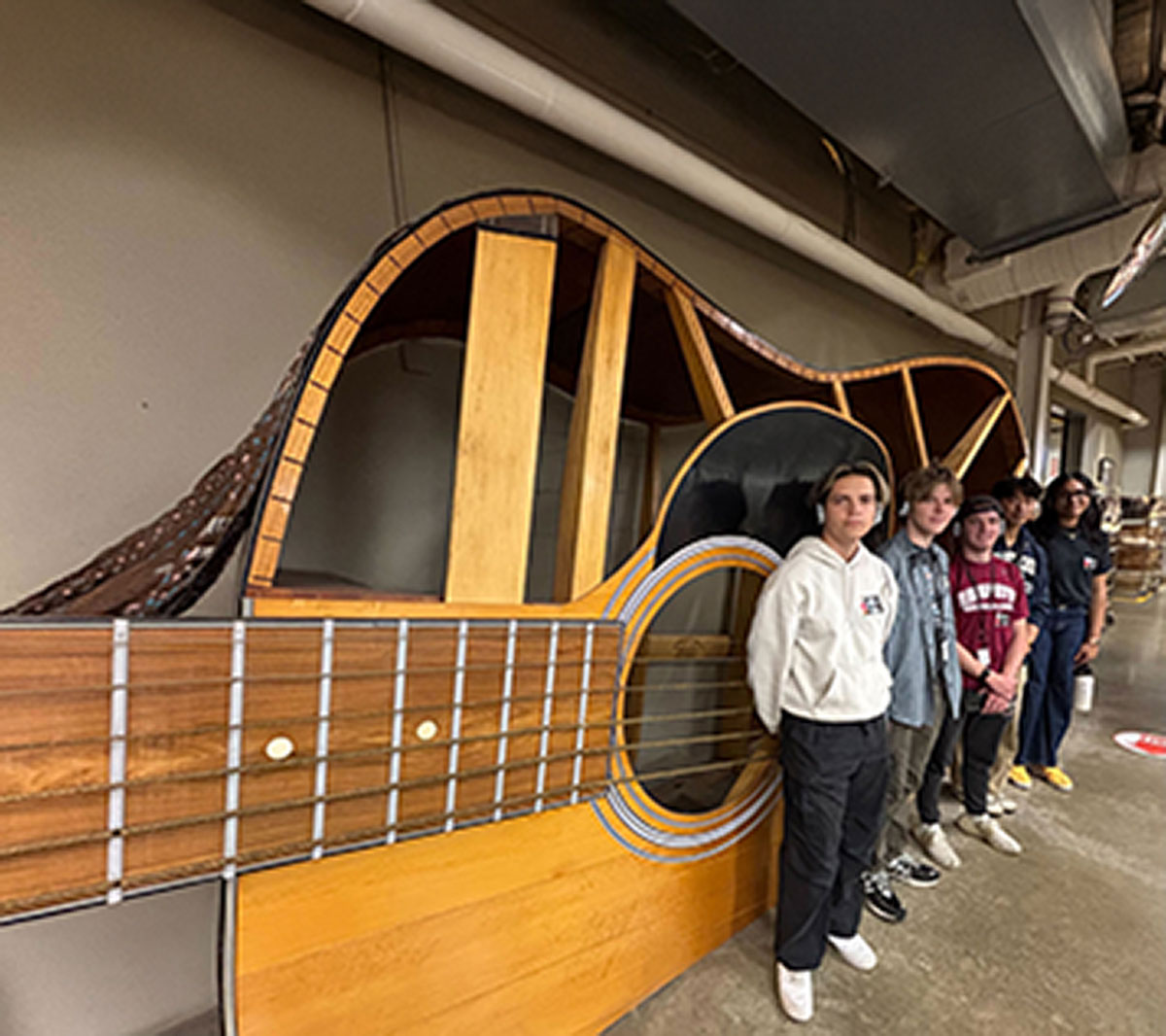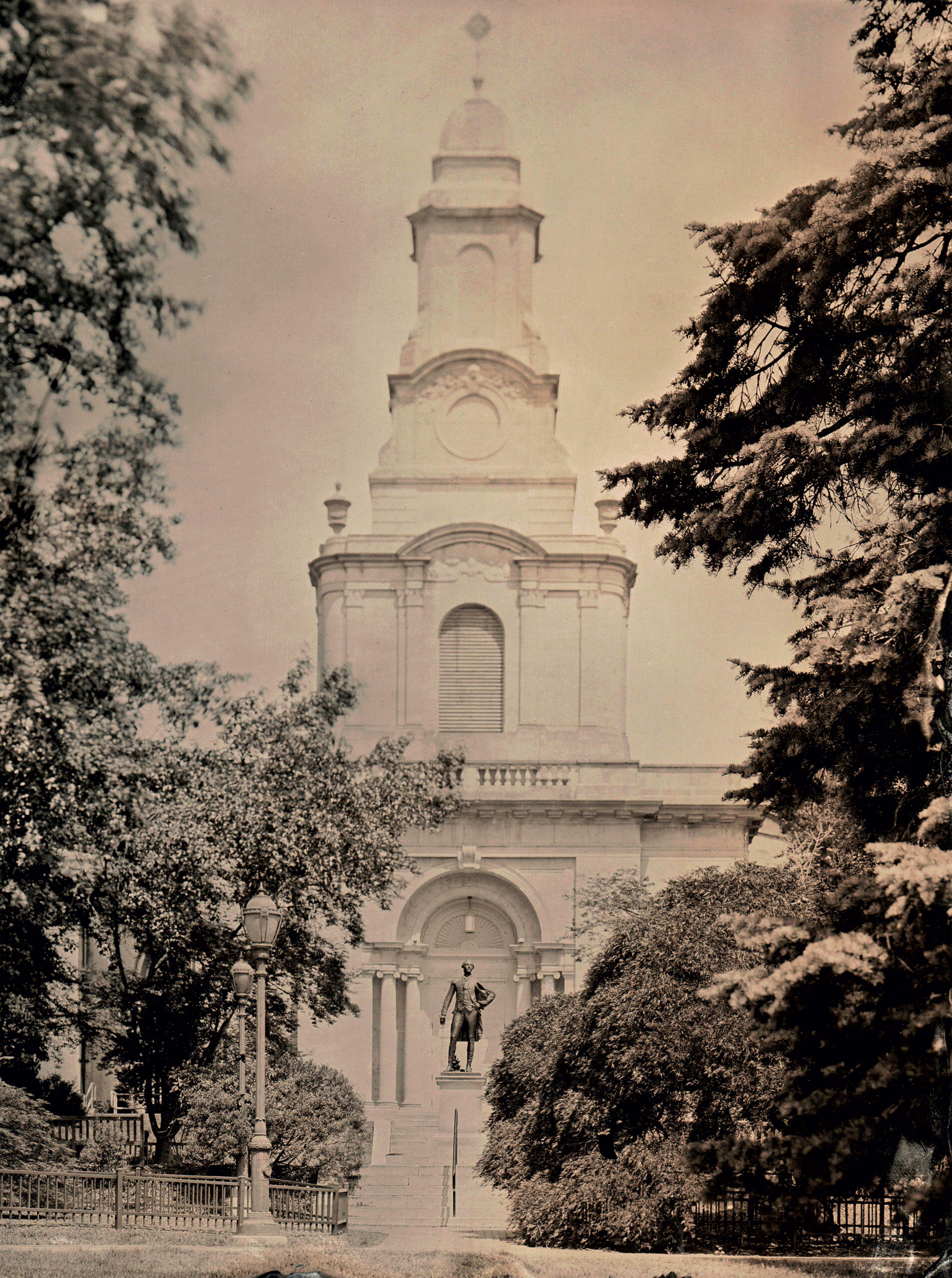The Posse effect
For more than 20 years, The Posse Foundation has empowered hundreds of Lafayette students to harness their leadership potential—and change the face of the campus, the country, and the world.

ILLUSTRATIONS BY SOL COTTI
Savanna Touré ’21 flipped on the television to quell her anticipation of the phone call—a call that, if she received it, would alter the course of her life. Then, the initial ring pierced the air. On the other end of the receiver, she heard, “You got it. You got Posse.”
With that news in November 2016, Touré landed a spot as a member of the Lafayette Posse D.C. 11 cohort and earned a full-tuition scholarship. She also became a part of a much larger network that has set 13,000 students across the U.S. on the path to success since its founding 35 years ago.
“That was the opportunity I had been dreaming of, the validation of years of hard work,” says Touré, who, since high school, dreamt of studying medicine and conducting biomedical research. “In that moment—with my mom by my side, with our financial worries starting to dwindle, and with new opportunities on the horizon—my world was suddenly full of endless possibilities.”

The Posse Foundation got its start in New York City in 1989, when its founder and president, Deborah Bial, was working for a youth organization providing leadership workshops to students.
“At the time, so many smart students from the area were going to college and dropping out six months later,” Bial says. “And one of those students said to me, ‘I never would’ve dropped out of college if I’d had my posse with me.’”
“It was the opportunity I had been dreaming of, the validation of years of hard work,” says Savanna Touré ’21. “My world was suddenly full of endless possibilities.”
That sparked Bial’s idea to partner with colleges and universities throughout the country to identify high school students with extraordinary academic and leadership potential, but who may struggle financially or without a supportive network away from home. These Posse Scholars would earn full-tuition, merit-based scholarships and be placed at schools in diverse teams of 10 students—their “Posse.”
The ultimate goal, Bial says, is to position these scholars as not just leaders in their chosen academic fields, but also as catalysts for positive change within their various campus communities. “We’re deliberately working to build a leadership network for the country that represents the diversity of the American population,” she says, explaining that Posse does not screen for race, need, or gender. “We solely admit students based on their talent, excellence, and potential to succeed.” Considering those qualifications, the foundation still draws a pool that is 80% Black and Latinx; more than 50% first-generation college students; and a majority that is, economically, from the lowest socioeconomic quartile. “That really says something,” Bial says.
Posse Scholars nationwide have collectively been awarded $2.24 billion in scholarships and have graduated at a staggering rate of 90%. And the transformative power of Posse reverberates long after scholars have a diploma in hand: Of those who graduated more than 10 years ago, at least 80% are in a higher economic class now than when they were growing up.
The Posse class matriculating in fall 2025 will be the largest one to date: 920 students will be selected from the more than 17,000 who will be interviewed. Currently, the foundation has 67 higher education institutions on its roster of partners, which Tristan Thompson ’13—a Lafayette Posse alumnus who is now program director of the foundation’s Los Angeles chapter—says are “doing the hard work of ensuring that their schools are reflective of what leadership should look like in this country.”
Posse recruits from more than 20 cities across the country; while most schools partner with one program, some schools, like Lafayette, affiliate with two. (Lafayette recruits cohorts from both New York City and Washington, D.C.)
Lafayette’s inaugural cohort, Posse N.Y. 1, arrived on College Hill in fall 2002 after then-president Arthur Rothkopf and a team of administrators decided to commit to the program. “They saw this as a new approach to reach students who wouldn’t normally think of applying to Lafayette,” says Wendy Hill, director of Hanson Center for Inclusive STEM Education at Lafayette, who served as Posse liaison from 2009 to 2014. The program thrived at the College, and Posse D.C. 1 was added shortly thereafter in fall 2006.
Over the course of the last two decades, about 400 Posse alumni have graduated from Lafayette, having earned approximately $78 million in scholarships from the College, Bial estimates. That, she explains, is thanks to the undertaking of the Lafayette administrations that have continued to commit to diversity in higher education. “President Nicole Hurd is an expert in understanding issues of access to higher education and executing ideas that would equal the playing field for students from different backgrounds,” Bial says, referring to Hurd’s decades-long career as the founder and CEO of College Advising Corps—the country’s largest college access program serving low-income, first-generation, and underrepresented high school students—prior to her becoming Lafayette’s 18th president. “To partner with her is special for us.”
Hurd says Bial’s shared commitment to student success and the work she has championed through The Posse Foundation has been an inspiration to her for many years: “The College has greatly benefited from the intelligence, resilience, and leadership of Posse Scholars for over two decades,” Hurd says, adding that the partnership with the foundation has truly been a gift to the Lafayette community. “We are strengthened by their contributions to the College while on campus, and their leadership in their professions and communities after graduation.”
What makes Posse and Lafayette a complementary fit, says Tim Cox—dean of advising and co-curricular programs, who also is the College’s current Posse liaison—is that the mission of Posse aligns with that of Lafayette. “Lafayette’s mission highlights the importance of the free exchange of ideas, of having students look at their own cultures in relation to those of others and develop themselves into constructive members of society,” Cox says. “That’s exactly what Posse does.”

On College Hill, as at Posse’s campus partners across the nation, Posse Scholars are commonly found at the helm of various student organizations and activities: Here, they’re resident advisers, Student Government presidents, D.Y.E.R. Fellows, orientation leaders, writing associates, and CaPA Fellows. Several have been Pepper Prize winners. “At any given time, there are 80 Posse Scholars at Lafayette. I would say they make up half of our student organization leaders,” says Robert Young ’14, who served as director of intercultural development and a Posse mentor at Lafayette for the past several years. Young also is a Lafayette Posse D.C. 5 Scholar.
They have a history of excelling in the classroom as well. Touré became the first student in the College’s history to be awarded a Truman Scholarship, in addition to being a Barry Goldwater Foundation Scholar and an EXCEL Scholar. She later completed a graduate research fellowship at the Mayo Clinic School of Graduate Medical Education studying breast cancer disparities. Currently, Touré is a research technician at Duke Human Vaccine Institute, working with other scientists to develop the HIV-1 and universal pan-coronavirus vaccines.

Basit Balogun ’21, a Posse N.Y. Scholar who achieved a superb academic record and dean’s list honors as a computer science major, landed a prestigious internship during his junior year at Goldman Sachs’ engineering division—where he now works full time as a quantitative strategist. Eline Pellicano ’24—who currently serves as president of the Lafayette African and Caribbean Student Association and as a resident adviser—has taken abroad her research on the experiences of women immigrants several times to Senegal and London as a Gilman Scholar, Assante-Carrasco Fund recipient, and Bergh Family Fellow. After Lafayette, she hopes to attend graduate school—like nearly half of all Posse grads choose to do—and eventually pursue a career in advocating for international human rights.
Lafayette Posse graduates have gone on to leave their mark on virtually every sector—from medicine to law, arts to education, business to government, and beyond. “I don’t know a single Posse Scholar who is looking for an opportunity after they graduate,” Young says. “They already know their next steps to impact the world, because they’ve already been doing it.” Nationwide, scholars are on a promising trajectory to success: Nearly 10% of Posse alumni are in a CEO/president, C-suite, or executive-level role just six or more years after graduating.
Rasheim Donaldson ’06 is an esteemed attorney who recently earned the New York City Bar Association’s Municipal Affairs Award for his outstanding achievements with the NYC Law Department. Donaldson has been a passionate advocate for justice since he was a teenager at Frederick Douglass Academy in Harlem. “While I was in high school, I didn’t love all that was around me,” he says. “A lot of people who came from high-need neighborhoods weren’t fully in control of their circumstances because of the lack of access to resources.”
Donaldson came to Lafayette as a member of the College’s first Posse cohort, Posse N.Y. 1, and says he initially experienced some culture shock. Being a member of the inaugural Posse class also came with its own set of challenges: Donaldson says he and his fellow scholars felt a heightened pressure to succeed on campus. “We were expected to be high-performing and meet a certain standard,” he says, explaining that only motivated them further. “We worked even harder to demonstrate our talent and show the larger community what Posse is all about.” In addition to being a manager of Lafayette’s men’s basketball team during his first year, he later served as a resident adviser, president of the Association of Black Collegians, and a member of Brothers of Lafayette.
And soon, there was growth. Through his studies as an anthropology and sociology major, he discovered his interest in law. He volunteered for Big Brothers Big Sisters in Easton, where he saw the effects of domestic violence and poverty. And, he says, through opportunities to study abroad in Kenya and Tanzania, and to help feed the homeless in San Francisco during an Alternative Spring Break trip, he discovered himself as he immersed himself in the experiences of others. “It was empowering,” Donaldson says, “and I’m deeply grateful to Lafayette and The Posse Foundation for identifying me as someone to invest in.”
After graduating, Donaldson earned a J.D. degree from Wake Forest University and a Master of Laws from Temple University Beasley School of Law. He went on to serve as assistant district attorney at the Bronx County District Attorney’s Office, and as deputy borough chief of the New York City Law Department. After 10 years handling criminal cases, Donaldson shifted to a career as a personal injury attorney at Grey & Grey LLP, where he now advocates for victims of negligence.
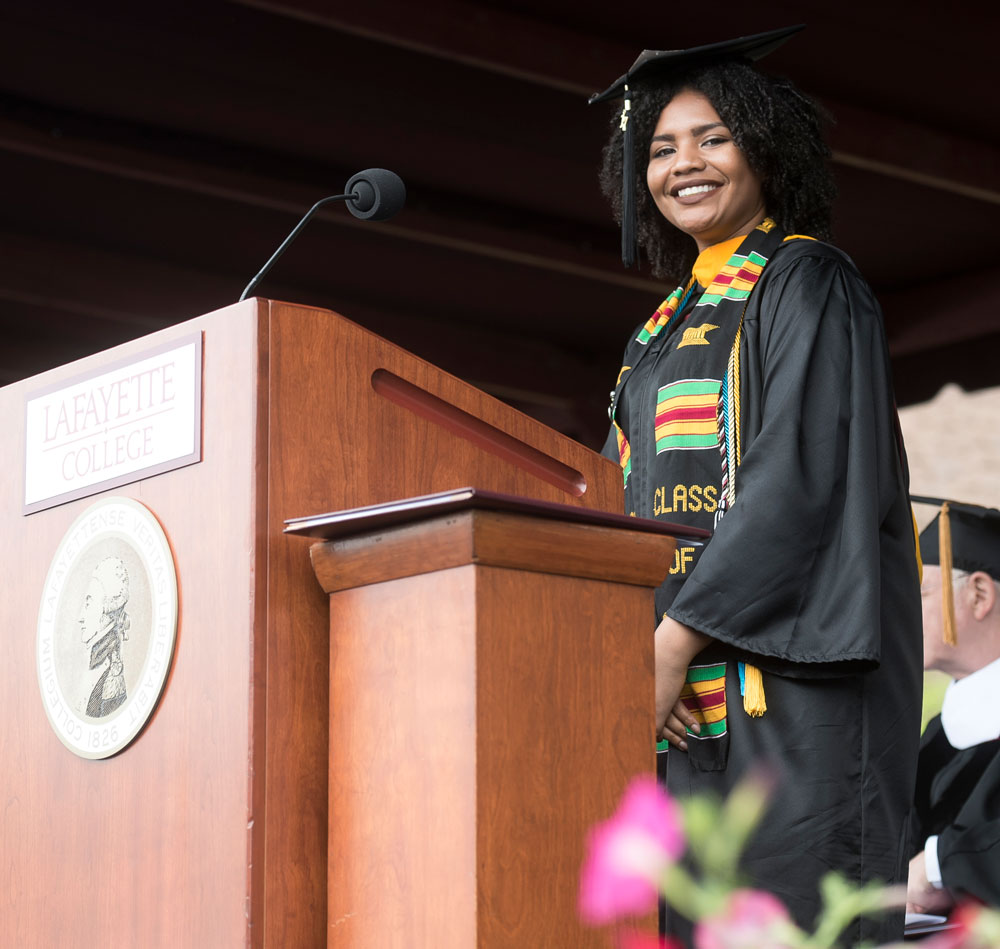
He has also served as a mentor for New York City students who are interested in pursuing careers in the legal arena. “There’s a great need for diverse lawyers,” he says. “And I want to create opportunities and pipelines for others to explore the field and achieve their dreams.”

Many alumni scholars credit their Posse mentors for having helped guide them through the ups and downs of college life and prepare them for the real world after graduation. Some are so inspired by the support that they go on to become mentors themselves.
As the oldest of her siblings, and as a member of an immigrant Jamaican family who came to the U.S. seeking a better life, Terese Brown ’07 felt a responsibility to accomplish every dream her parents had, and to make her family proud. While attending the High School of Fashion Industries in Manhattan, Brown sought undergraduate opportunities that would allow her to gain practical business know-how while exercising her love for fashion. Brown earned a scholarship at Lafayette as part of Posse N.Y. 2, where she connected with Gladstone “Fluney” Hutchinson, associate professor of economics, who also hailed from Jamaica.
Brown, who majored in economics and business as well as studio art, says her Posse mentors, Profs. Liz McMahon and Gary Gordon, were pivotal to her college experience. “They taught me how to advocate for myself and bring to light issues of race, class, and privilege,” she says. “They helped my Posse navigate tough conversations about racism and stereotypes.”
“One of the most beautiful things about Posse is when you’re a part of it, you’re a part of a bigger story,”
Tristan Thompson ’13
Posse alumnus and a program director for The Posse Foundation
Following her time at Lafayette, Brown earned a fashion design degree from the Fashion Institute of Technology before founding Terese Sydonna, a luxury womenswear collection, in 2011. Since then, her brand has been sold at exclusive retailers and is empowering professional women to be authentic—something she felt was lacking in corporate America. “I noticed women were facing incredible insecurity. There wasn’t a lot of freedom to wear your natural hair as a Black woman or wear pieces that identified with your personal style,” Brown says. “I vowed to give professional women a voice.”
Brown serves as a mentor for high school and undergraduate students interested in the fashion industry, and for Lafayette students through the McDonogh Network. “It’s crucial for me to support others the same way Liz, Gary, and The Posse Foundation supported me,” she says.
Kyvory Henderson ’12—who majored in engineering studies and played defensive end for the Leopards—says he owes much of his success at Lafayette to the support he received from his fellow Posse D.C. 3 Scholars and mentors, Profs. Larry Malinconico and Gordon, specifically how to balance a demanding schedule as a student-athlete.
As the son of a U.S. Army officer who served in Desert Storm, Henderson moved around the globe during his childhood. Originally born in Germany, Henderson eventually settled in Glen Burnie, Md. He was a standout student and athlete at North County High School, where he earned a 4.0 GPA and was an All-County football player.
Lafayette’s Engineering Department, rigorous academics, and intimate class sizes made the College a desirable choice for him. And, after his guidance counselor nominated him for a Posse Scholarship, it was also within reach. “It was a place where I could thrive and explore,” he says. “Posse opened the door for me to go to a school that my family and I would not have been able to afford on our own.”
It also set him on the path to a career in developing equipment that improves safety for athletes, military personnel, astronauts, and more. (“I was always interested in the intersection between engineering and biology,” Henderson says.) Henderson earned a master’s in project management from University of Virginia after graduating from Lafayette. Now, he is the director of business development at Diversified Technical Systems Inc. in Seal Beach, Calif., a hardware technology firm. “I am one of the only people of color in my field, and I take pride in trying to get others who look like me into this space,” he says. Henderson, who is in his final year of working toward his MBA at California State University, Long Beach, is paying it forward: He has served as a mentor for Posse, has delivered lectures at higher ed institutions across the country, and is a donor to Lafayette’s robotics and football teams. He and his mother established the Henderson Scholarship at his high school, which is awarded annually to a student-athlete of color who is interested in pursuing a college education in a STEM-related field. “For me,” he says, “it always goes back to leaving the world a little bit better than I found it.”
Mentors are equally impacted by their relationships with their Posse cohorts: Malinconico—associate professor of geology and geophysics, who has been a mentor since 2008—says his interactions with his Posse students have been an eye-opening experience. “Being a mentor has made me sensitive to the issues and social inequities faced by our students of color and first-generation students,” he says. “It also has made me more aware of the preparation that some students in my courses may or may not have had prior to coming to Lafayette.”

Many scholars form bonds that last a lifetime, not only with their own cohort, but also with the cohorts that come before and after them.
“Posse is a generational organization,” Pellicano says. “Scholars who were older than me coached me through the basics of being a college student.” Her own cohort, she says, is her chosen family.
Thompson—who still keeps in touch with his Posse mates more than a decade after graduating—tries to impart on current scholars that there will always be a level of shared understanding that ties cohorts together.
“One of the most beautiful things about Posse is, when you’re a part of it, you’re a part of a bigger story,” Thompson says. “We live by the mantra ‘Posse love,’ because it’s a very real thing shared among the people in this organization. And that’s something that can’t be bought.”
The Posse Experience
A Few of the ways Posse Scholars get special support
Pre-college prep
Newly selected Posse Scholars go through intensive programming—called Pre-Collegiate Training—from January to August of their senior year of high school, during which they are prepared by Posse trainers to matriculate at their colleges. The experience, which requires weekly two-hour workshops, gets them acclimated to school before they set foot on campus: learning expectations, meeting mentors, and building a community with their cohort.
Mentor meetings
Posse mentors are typically tenured faculty who meet weekly with their assigned cohorts, and biweekly for one-on-ones with individual cohort members. Eline Pellicano says that her mentor, Prof. Cliff Reiter, always reminded her she was at Lafayette for a reason: “That coaching through the struggle was something I could always fall back on.”
Retreats
Each spring, Lafayette’s cohorts and staff, as well as guests from the Lafayette community, spend a weekend off campus during PossePlus Retreats. “It gives our students a chance to talk about real-world political, social, and educational issues,” Tim Cox says. “And then we get to bring those ideas back to campus and share them with others.”
Posse’s career program
Scholars have access to professional development training and events, and vast and tightly interconnected alumni networks, as well as internship, fellowship, and job opportunities across industries.
Graduation
In addition to attending commencement with their entire graduating class, Posse seniors take part in their own graduation ceremony at Lafayette. Tristan Thompson describes it as a crowning moment for the entire Posse community.

